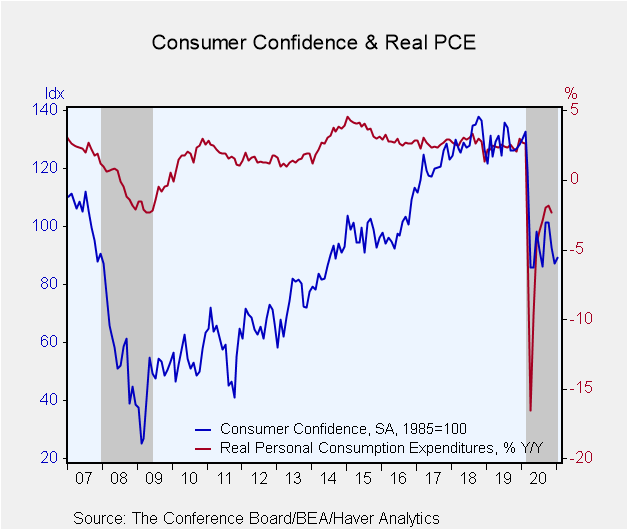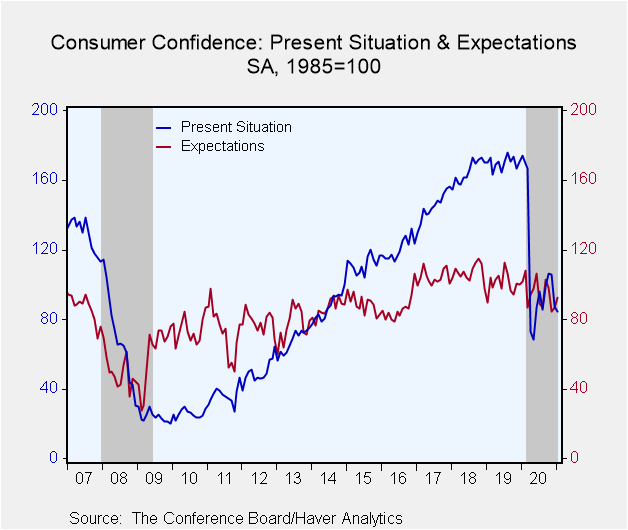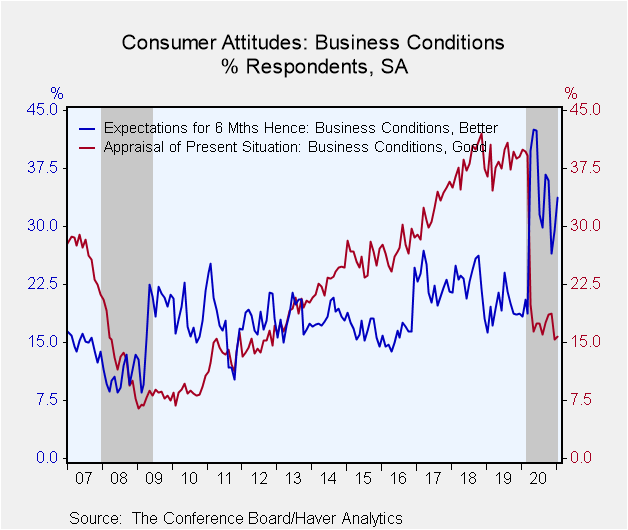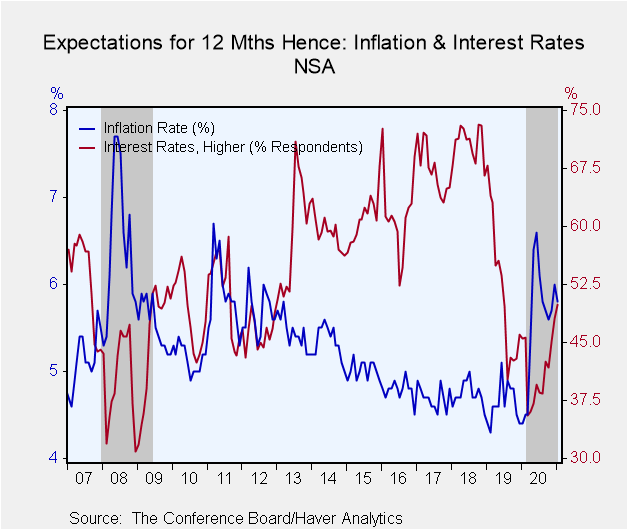 Global| Jan 26 2021
Global| Jan 26 2021U.S. Consumer Confidence Recovers During January
by:Tom Moeller
|in:Economy in Brief
Summary
• Consumer confidence rebounds following two months of decline. • Expectations improve while the current conditions reading continues to fall. • Jobs gap deterioration suggests higher unemployment rate. The Conference Board Consumer [...]
• Consumer confidence rebounds following two months of decline.
• Expectations improve while the current conditions reading continues to fall.
• Jobs gap deterioration suggests higher unemployment rate.
The Conference Board Consumer Confidence Index increased 2.5% (-31.5% y/y) to 89.3 during January after falling to 87.1 in December, revised from 88.6. A reading of 89.2 had been expected in the Action Economics Forecast Survey.
The Consumer Expectations reading rose 6.3% (-8.8% y/y) this month to 92.5 after increasing 3.2% in December. Meanwhile, the Present Situation index fell 3.2% (-51.5% y/y) to the lowest level since May.
The jobs gap, representing the difference between respondents indicating that jobs are plentiful and those saying jobs are hard to get, declined to -3.2% from -1.9%, suggesting the unemployment rate may rise in January. This series has an 80% correlation with the unemployment rate over the last ten years. The decline in the labor market differential occurred as the jobs plentiful measure fell and the jobs hard to get index rose.
Business conditions were perceived as good m/m by a fairly steady 15.8% of respondents. That was down from 40.0% in January of last year. Expectations that business conditions would improve in six months rose to 33.7%, up from November's low of 26.5%. More jobs were expected in six months by a higher 31.3% of respondents, up from 25.0% in November. Alternatively, to the downside was the percentage expecting income to increase to 14.4%, a reading only slightly higher than the recent low of 13.0% reached in August.
The expected inflation rate in twelve months fell slightly to 5.8% after increasing to 6.0% in December. That was increased from the 4.4% low twelve months ago. The share of respondents planning to buy a new home rose to 1.2% in January, the highest number in three months. Those planning on buying a major appliance held fairly steady m/m at 48.4%, up from the low of 43.3% in October.
Confidence fell for individuals both under 35 and for the 35-to-54 age group. Confidence increased slightly for those over 55 years old.
The Consumer Confidence data are available in Haver's CBDB database. The total indexes, which are indexed to 1985=100, appear in USECON, and the market expectations are in AS1REPNA.
| Conference Board (SA, 1985=100) | Jan | Dec | Nov | Jan '20 | 2020 | 2019 | 2018 |
|---|---|---|---|---|---|---|---|
| Consumer Confidence Index | 89.3 | 87.1 | 92.9 | 130.4 | 101.0 | 128.3 | 130.1 |
| Present Situation | 84.4 | 87.2 | 105.9 | 173.9 | 109.8 | 169.8 | 164.8 |
| Expectations | 92.5 | 87.0 | 84.3 | 101.4 | 95.2 | 100.6 | 107.0 |
| Jobs Gap (%) | -3.2 | -1.9 | 6.9 | 35.3 | 6.8 | 33.1 | 27.6 |
| Jobs Plentiful (%) | 20.6 | 21.0 | 26.3 | 47.2 | 27.8 | 45.8 | 42.0 |
| Jobs Hard to Get (%) | 23.8 | 22.9 | 19.4 | 11.9 | 21.0 | 12.6 | 14.4 |
Tom Moeller
AuthorMore in Author Profile »Prior to joining Haver Analytics in 2000, Mr. Moeller worked as the Economist at Chancellor Capital Management from 1985 to 1999. There, he developed comprehensive economic forecasts and interpreted economic data for equity and fixed income portfolio managers. Also at Chancellor, Mr. Moeller worked as an equity analyst and was responsible for researching and rating companies in the economically sensitive automobile and housing industries for investment in Chancellor’s equity portfolio. Prior to joining Chancellor, Mr. Moeller was an Economist at Citibank from 1979 to 1984. He also analyzed pricing behavior in the metals industry for the Council on Wage and Price Stability in Washington, D.C. In 1999, Mr. Moeller received the award for most accurate forecast from the Forecasters' Club of New York. From 1990 to 1992 he was President of the New York Association for Business Economists. Mr. Moeller earned an M.B.A. in Finance from Fordham University, where he graduated in 1987. He holds a Bachelor of Arts in Economics from George Washington University.
More Economy in Brief
 Global| Feb 05 2026
Global| Feb 05 2026Charts of the Week: Balanced Policy, Resilient Data and AI Narratives
by:Andrew Cates










